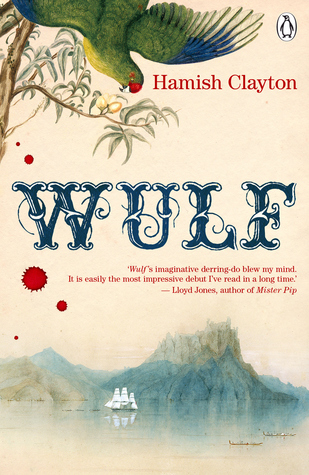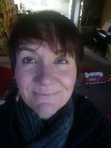Rich reading, and reasons to write
 This morning, in time set aside to write, I slunk away from my desk for half an hour and started Hamish Clayton's Wulf (Penguin Books, 2011: you can read an informative review here). I found myself wanting to read aloud so as to live the words and see the images:
This morning, in time set aside to write, I slunk away from my desk for half an hour and started Hamish Clayton's Wulf (Penguin Books, 2011: you can read an informative review here). I found myself wanting to read aloud so as to live the words and see the images:
Every word spoken, sent like a raft of smoke onto the air of that strange country, smelled like the blood riding the breath of their great chief..
The prose is mesmerising and there's promise of a compelling story. I also love the occasional prose-poetry that marks off segments in the first chapter, and Clayton's hypnotic use of repetition. (Made a mental note to mention him in writing classes as an example of a writer who breaks that not-particularly-hard-&-fast rule beautifully. Beginner writers often unconsciously repeat words from sentence to sentence.) This'll probably turn out to be one of those books that will live on my bookshelves all my life: no trade-in at Arty Bees.
I did write, finding my way in the dark as usual. I love those sparking moments when a new aspect of a character whom you barely know enough to narrate, yet, reveals itself. Kept my leg tied to the chair.
I've also recently read Their Faces Were Shining (Tim Wilson, VUP), and August (Bernard Beckett, Text Publishing), but won't write about those novels here as am reviewing them for New Zealand Books. However, I'll say it was no hardship to have to reread them while preparing the review, and anyone who wants to be happily submerged in fiction over the Easter weekend could look to these two New Zealand writers.
 A significant cohort of the boys at Tobias Wolff's Old School (set, I think, in the 1950s) want to be writers. Of course, there's no mention of the Internet, or America's Next Top Model, or MTV. This atmosphere of dedicated literacy reminded me of reading old copies of Life magazine in Wellington Central Library while researching early 1960s US culture, and being startled by the elegance, lyricism and complexity of their current affairs writing – politics aside.
A significant cohort of the boys at Tobias Wolff's Old School (set, I think, in the 1950s) want to be writers. Of course, there's no mention of the Internet, or America's Next Top Model, or MTV. This atmosphere of dedicated literacy reminded me of reading old copies of Life magazine in Wellington Central Library while researching early 1960s US culture, and being startled by the elegance, lyricism and complexity of their current affairs writing – politics aside.
The school believes itself to be an egalitarian meritocracy, blind to class or financial distinctions. However, Wolff's protagonist, hiding his Jewishness because he has the 'tremor of apprehension' that the school somehow sets apart those identifying as Jewish, speculates on the motivation of the aspiring writers:
Maybe it seemed to them, as it did to me, that to be a writer was to escape the problems of blood and class. Writers formed a society of their own outside the common hierarchy.
Does anyone out there want to comment on why they write? Elizabeth Knox included her essay 'Why I Write' in her collection, The Love School (more on that another time). Elizabeth seems to me like someone who has always worked in interesting ways towards being conscious of what's going on in her mind (although she's also said that she's not the type of writer who's solely curious about her psychological workings, but instead naturally turns to making up stories, which tendency is pretty clear from the novels she's written). This extract is a lovely example of the consciousness, though:
In the dedication at the beginning of R. L. Stevenson's novel The Master of Ballantrae, the writer talks as if to to the father, who, addled by strokes, is no longer able to follow his work. Stevenson says what I'd like to say in dedicating my next book to my dead father (to the man his family all but lost years before he died). Stevenson says it perfectly, but I'd like to add this – that you don't just walk away from any of the people from whom you write. You notice them missing. You stop and go back and try to coax and help. You stand still and wait for them to be themselves again. Perhaps you get mad with them. But you wait, you wait. Then finally you walk off and leave them behind. And you find that, while you've waited, a dark wood has sprung up around you…
(A friend recently returned my copy of The Love School. I had mourned it, unable to remember whom I'd lent it to and thinking it lost, but it was on her bedside table the whole time, one of a pile of books lent over a year ago during a post-op recovery period. She's very good about – eventually – returning books, so I needn't have worried. These days I write down every book that leaves the house in a notebook kept on the bookshelves for the purpose. No more lost books! Who has my copy of Maurice Gee's The Big Season, or Patricia Grace's Baby No-Eyes? Huh?)
If we narrate our lives through our thoughts and dreams, first, and then through incidental conversations at work or the bus stop or on the pillow or in the car, that has never felt like enough for me. When I haven't been writing, I feel like I don't know myself. Even if everything other element in life is running along perfectly, it all feels skewiff. Conversely, dust can accumulate, letters can go unanswered, my attempts at cooking dinner can be mediocre, and it's all OK if I've written, even if the writing is unusable. And there's something about joining in with the song, the continued murmur, that long-lasting overseeing conversation and the talk that goes beyond our daily experience and is also tied to it.











